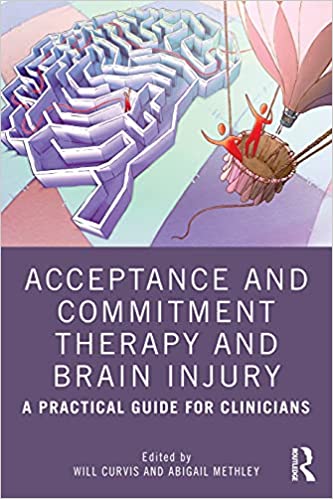Acceptance and Commitment Therapy and Brain Injury: A Practical Guide for Clinicians

Book Details
- Publisher : Routledge
- Published : 2021
- Cover : Paperback
- Pages : 212
- Category :
Individual Psychotherapy - Category 2 :
Neuroscience - Catalogue No : 95982
- ISBN 13 : 9780367456245
- ISBN 10 : 0367456249
Reviews and Endorsements
This is a helpful book for practitioners and researchers alike. Acceptance and commitment therapy is becoming more widely known and researched within the field of neurological conditions and a book aimed at working with people with brain injury and their families and systems is a timely addition to the literature. - Fiona Eccles, Clinical Psychologist and Lecturer, Lancaster University.
Will Curvis and Abigail Methley are to be congratulated for this timely collation of relevant research and practical guidance on ACT, showing how the approach can be used to support psychological wellbeing in people with neurological conditions. Particular highlights are scene-setting from experts by experience and discussion of cultural considerations, together with insights into use of ACT with specific brain injury presentations in a variety of settings. - Katherine Carpenter, Consultant Clinical Neuropsychologist and Chair of The British Psychological Society's Division of Neuropsychology.
This really is an excellent compendium of chapters which most helpfully detail the potential for Acceptance and Commitment Therapy to improve the psychological well-being of people with a range of different neurological conditions. I particularly valued the chapter on progressive neurological conditions given the relative lack of therapeutic approaches currently available for this group of individuals. - Jane Simpson, Professor of the Psychology of Neurodegenerative Conditions, Lancaster University.
This is a much-needed book. ACT is a well-established psychological therapy but there have been very few comprehensive accounts of how ACT can be used to support people in the context of brain injury. This book illustrates very practically how ACT can be integrated into holistic neuropsychological rehabilitation, with both adults and children, in a wide range of neurological conditions. Importantly, the book discusses how ACT can be adapted for people with moderate or severe brain injury, whilst retaining its core focus on committed action, being present and values-based goal setting. There is something for everyone in this book - whether you are new to ACT, new to neuropsychological rehabilitation or an old hand at both, this book will be useful. - Jon Evans, Professor of Applied Neuropsychology, Institute of Health & Wellbeing, University of Glasgow.
Neuropsychologists working in brain injury rehabilitation will want to read this book about ACT as most survivors of stroke, traumatic brain injury, encephalitis, anoxia and other diagnoses will have both cognitive and emotional problems. For the emotional problems, ACT has become an important tool and this edited book will provide a wealth of detailed information addressing a range of related topics including mild and severe injury, cultural issues, identity, holistic rehabilitation, future directions, and the concerns of both adults and children. -

